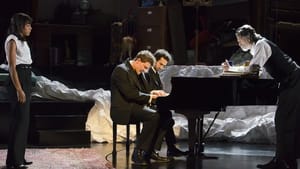Stay in the Loop
BSR publishes on a weekly schedule, with an email newsletter every Wednesday and Thursday morning. There’s no paywall, and subscribing is always free.
Breaking the block
Dave Malloy's 'Preludes'

Writers’s block: So many of the greats, including Tennessee Williams and Eugene O’Neill, have suffered from it. Tom Stoppard recently recovered from it. Charlie Kaufman wrote a film about it (Adaptation). Woody Allen played a character named Harry Block who struggled with it in his film Deconstructing Harry.
But who knew that the great composer Sergei Rachmaninoff (1873-1943) was also afflicted? Composer/author Dave Malloy has seized on the inspired idea to dramatize the Russian’s remarkable recovery in Preludes, an arresting new musical (naturally).
Malloy has done his research. A child prodigy, Rachmaninoff entered the St. Petersburg Conservatory at 10 and had his first major success at 19, with his famous Prelude in C# Minor. But following a fiasco performance of his Symphony No. 1 in D Minor, he plunged into a three-year period of severe depression and writer’s block. Rachmaninoff’s wife, Natalya, finally engaged a hypnotherapist, Nikolai Dahl, to work with her afflicted husband.
Malloy begins his play in 1899, when Rachmaninoff, at the age of 24, began working with Dahl. The two-hour musical play spans a two-year period of treatment, culminating in Rachmaninoff’s composition of the Piano Concerto No. 2 in C Minor, one of his most celebrated works.
More than one performer per character (and vice versa)
What makes Preludes such a marvelous show is the ingenious theatricality with which Malloy and his gifted collaborator, director Rachel Chavkin, chose to dramatize the inner workings of Rachmaninoff’s mind. They’ve cast two performers to play the role of Rachmaninoff, an actor (Gabriel Ebert) and a concert pianist (Or Matias). From the minute they make their dramatic entrance together, we’re held in their thrall. The actor interacts with the other characters, while the pianist plays sublimely (Matias is a brilliant, Juilliard-trained pianist).
But that’s only one of the arresting techniques that Malloy and Chavkin employ. They cast one actor (Chris Sarandon) to play many of the personages whom Rachmaninoff encounters over this two-year period. We see Chekhov and Tchaikovsky (played by Sarandon) encourage him; we watch Tolstoy (Sarandon again) belittle him, and so on. There are more inventive casting choices: Nikolai Dahl, the therapist, is played by Eisa Davis, an African-American actress, who follows Rachmaninoff (played by Ebert) around the stage, whispering in his ear, coaching him, cajoling him. “I’d like to be remembered. I’d like to write something that changes everything,” he tells her, desperate to compose again. Another character, the famous bass Chaliapin, played by talented Joseph Keckler, sings Rachmaninoff songs, accompanied by the second Rachmaninoff, Matias.
Breaking the block
The coup de théâtre comes with the fateful performance of the Symphony No. 1 in D Minor, conducted by the acclaimed composer Glazunov (also played by Sarandon), who was allegedly drunk at the time. While Matias plays the piano, two musicians on synthesizers create the cacophony of the under-rehearsed orchestra. That disastrous event is offset, however, by the final moments of the production, when the two Rachmaninoffs, actor and musician, play the celestial Piano Concerto No. 2 in C Minor, which “broke the block.”
Rachmaninoff’s is not the only music played throughout this clever production. Malloy has written a dozen of his own original compositions, songs that tell the story in a modern, popular style. This gives the production an added modern dimension, along with numerous contemporary references (to Elton John, email, and subways, for example.) At first, the eclectic stylistic choice of putting two different time contexts onstage is jarring and sometimes distracting (at one point, you see a Zabar’s coffee cup and a box of Raisinets on the period set). But once you go with Malloy’s flow, you recognize the merit of telling a story in a style that not only relates to a turn-of-the-century composer but to artists today as well.
An inspired team
Malloy and Chavkin have collaborated before on another eclectic musical production, the award-winning cabaret-style Natasha, Pierre & the Great Comet of 1812. Clearly, they’re an inspired artistic team, graced with daring, creativity, and ingenuity, from whom we can expect more exciting, new-age musical work to come.
At one point in the evening, Tolstoy asks Rachmaninoff: “Is such music needed? Who is it for?” Listening to the ethereal music of Sergei Rachmaninoff, played brilliantly by Matias while actor Ebert sits beside him on the bench, the answer is clear.
What, When, Where
Preludes, by Dave Malloy, developed with and directed by Rachel Chavkin. Through August 2 at the Claire Tow Theater, Lincoln Center Plaza, New York. http://www.lct.org/lct3/
Sign up for our newsletter
All of the week's new articles, all in one place. Sign up for the free weekly BSR newsletters, and don't miss a conversation.
